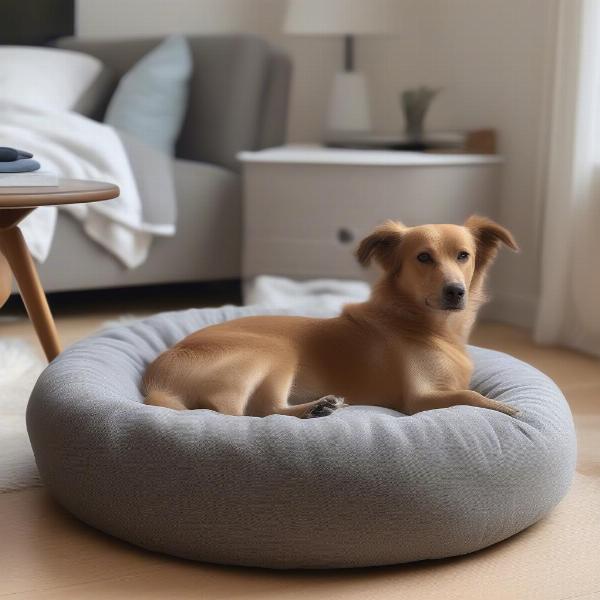When your dog starts walking in circles, it can be concerning. Is it just a quirky behavior, or is something more serious going on? This article will explore the various reasons why a dog might walk in circles, from simple playfulness to underlying medical conditions. We’ll help you understand what your dog’s behavior might be telling you and when it’s time to seek veterinary attention.
Understanding the Reasons Behind Circling Behavior
Dogs communicate through body language, and circling is one way they express themselves. Sometimes, it’s a perfectly normal behavior, like when they’re getting ready to settle down for a nap or getting “zoomies” from pent-up energy. Other times, circling can indicate a medical issue that requires attention. Let’s delve into the potential causes:
Normal Circling Behaviors
- Nesting: Before lying down, especially on a soft surface, dogs often circle to create a comfortable nest. This is an instinctive behavior inherited from their wild ancestors.
- Excitement: A burst of energy, often referred to as “zoomies,” can manifest as frantic circling. This is especially common in puppies.
- Playfulness: Circling can be a playful invitation to interact, especially if accompanied by bowing or tail wags.
 Dog Circling Before Sleep
Dog Circling Before Sleep
Medical Reasons for Circling
While some circling is normal, it’s crucial to recognize when it could be a sign of a health problem. Consistent or unusual circling, especially if accompanied by other symptoms, warrants a vet visit. Here are some potential medical causes:
- Vestibular Disease: This condition affects the inner ear and can cause balance problems, head tilting, and circling. It can occur suddenly and is more common in older dogs.
- Cognitive Dysfunction Syndrome (CDS): Similar to dementia in humans, CDS can cause confusion, disorientation, and repetitive behaviors like circling.
- Neurological Issues: Brain tumors, strokes, or other neurological problems can lead to circling, often accompanied by other neurological signs like seizures or weakness.
- Compulsive Disorders: Some dogs develop obsessive-compulsive behaviors, including circling, as a coping mechanism for stress or anxiety.
- Pain or Discomfort: If a dog is experiencing pain in a specific area, like its paws or tail, it may circle in an attempt to alleviate the discomfort.
When to Contact Your Veterinarian
If your dog’s circling seems excessive, changes suddenly, or is accompanied by other symptoms like head tilting, loss of appetite, lethargy, or changes in behavior, it’s essential to contact your veterinarian immediately. Early diagnosis and treatment are crucial for managing many of the medical conditions that can cause circling.
Questions to Ask Yourself
- How often is my dog circling? Is it a new behavior, or has it always been present?
- Are there any other symptoms? Look for changes in appetite, energy levels, balance, or other behaviors.
- Is the circling consistent, or does it come and go?
- Does the circling seem purposeful, like nesting, or does it appear aimless?
Conclusion
While observing your dog walking in circles can be alarming, understanding the potential causes can help you determine the best course of action. By paying close attention to your dog’s behavior and seeking professional help when necessary, you can ensure your furry friend’s health and well-being. Remember, early intervention is key to managing many medical conditions, so don’t hesitate to contact your vet if you have any concerns.
FAQ
- My dog circles before lying down. Is this normal? Yes, circling before lying down is a typical nesting behavior.
- My older dog has started circling and seems disoriented. What could this be? This could be a sign of vestibular disease or cognitive dysfunction syndrome. Consult your veterinarian.
- How is circling treated? Treatment depends on the underlying cause. It can range from medication to managing underlying anxiety or pain.
- Can I prevent my dog from circling? Preventing circling depends on the cause. For example, providing a comfortable bed can reduce nesting-related circling.
- Is circling always a sign of a serious problem? No, not always. It can be a normal behavior, but it’s important to monitor for other symptoms.
- What should I do if my dog suddenly starts circling more than usual? Contact your veterinarian immediately.
- Can stress cause a dog to circle? Yes, stress and anxiety can lead to compulsive behaviors like circling.
Related Articles on ILM Dog
About ILM Dog: ILM Dog is your trusted source for expert advice on all things dog-related. We offer comprehensive information on dog breeds, health, training, nutrition, grooming, and much more. From choosing the right breed to understanding your dog’s behavior, we’re here to support you every step of the way. For expert guidance on dog health, training, and products, contact us at [email protected] or call us at +44 20-3965-8624. We are committed to providing dog owners with the best resources and information to ensure a happy and healthy life for their canine companions.